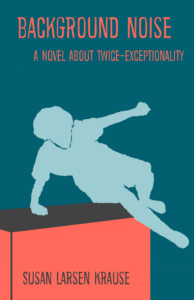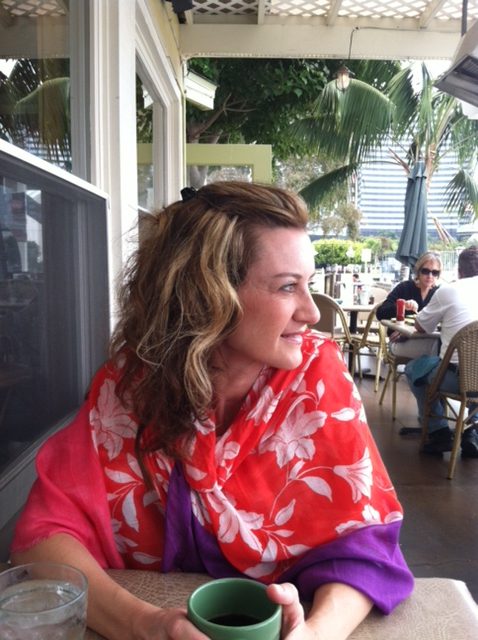Susan Krause Interview
Self-Publisher’s Showcase: Today we are joined by Susan Krause, author of Background Noise: A Novel About Twice-Exceptionality. Welcome to the Showcase Lounge, Susan.
SK: Thanks! I’m excited for my first official interview.
SPS: For any of our readers that haven’t come across your work previously, can you take a moment to tell us all a little about yourself?
SK: If you’ve ever seen someone sitting in a remote corner of a bookstore or coffee shop scribbling notes in a journal, approach with caution, that might be me. I’ve been scribbling notes in journals since I was little (wrote my first “novel” at age nine) and always planned to write fiction for a living. But like many of us, life demands our attention to other important things. I recently wrapped up a 25-year career in marketing where I wrote almost every day, but business writing was never my passion. I’ve always loved children’s literature. I have three children, so kidlit has always been a big part of our family time together. Now, I’m thrilled that I can write what I’ve always wanted to.
SPS: Your novel is about twice-exceptionality. Can you explain to any of our readers who may be unaware what the term refers to?
SK: The combination of a learning disability and giftedness is known as twice-exceptionality, and it’s more common than you might think. This includes autism, dyslexia, ADHD, physical disabilities and any other condition that interferes with the ability to learn. Twice-exceptional learners process information completely differently than neurotypical kids. In elementary school, often giftedness masks the learning disability, so kids are not diagnosed until around age 12. Gifted kids with learning disabilities are a high-risk for failure because of assumptions about their abilities.
SPS: What made you want to write a novel that focused on a 2e child?
 SK: It’s a complicated issue and I couldn’t find any children’s fiction on the topic. I believe that Background Noise is the first novel to be published that takes on the questions about twice-exceptionality and shows how these kids can be successful. This story is very personal to our family. My oldest son was diagnosed with ADHD Inattentive type, OCD and social anxiety at age 12. We also discovered at that time that he was gifted, which explained a lot of his uneven school performance and his unusual style of learning. But this diagnosis came too late to save him from several years of declining school performance and failing 7th grade. He became severely depressed and despondent, and I was unable to afford specialized schooling for him. 2E kids’ learning needs are complicated and many public schools are not equipped to help twice-exceptional children. In our case, the schools didn’t understand what was happening to him and I was even told they would not help him because they believed he was disinterested, lazy or just didn’t care. We went through five schools with no success in helping him learn, though many supportive special education teachers did what they could. He is now 18 and just about to graduate from high school, and I can’t say that he ever got the help that he truly needed. Like many brilliant kids who are differently wired, he figured out his own way to get through it.
SK: It’s a complicated issue and I couldn’t find any children’s fiction on the topic. I believe that Background Noise is the first novel to be published that takes on the questions about twice-exceptionality and shows how these kids can be successful. This story is very personal to our family. My oldest son was diagnosed with ADHD Inattentive type, OCD and social anxiety at age 12. We also discovered at that time that he was gifted, which explained a lot of his uneven school performance and his unusual style of learning. But this diagnosis came too late to save him from several years of declining school performance and failing 7th grade. He became severely depressed and despondent, and I was unable to afford specialized schooling for him. 2E kids’ learning needs are complicated and many public schools are not equipped to help twice-exceptional children. In our case, the schools didn’t understand what was happening to him and I was even told they would not help him because they believed he was disinterested, lazy or just didn’t care. We went through five schools with no success in helping him learn, though many supportive special education teachers did what they could. He is now 18 and just about to graduate from high school, and I can’t say that he ever got the help that he truly needed. Like many brilliant kids who are differently wired, he figured out his own way to get through it.
SPS: What can you tell us about the struggles Jeremy faces?
SK: Jeremy is a mirror image of my son. His struggles are deep and complex because there are so many misconceptions about both giftedness and ADHD. Gifted learners are NOT set up for success because they are gifted. ADHD kids are NOT lazy and in need of discipline. Jeremy’s experience demonstrates the loss, hurt and loneliness that twice-exceptional kids face. He’s friendless. He’s destroyed by failure. He doesn’t see himself as capable or even deserving of love and friendship. It takes the effort of parents, educators, mental health professionals and special education professionals to get kids like Jeremy to a place where they can be successful and see themselves as worthy and capable.
SPS: Who do you feel the novel would appeal to?
SK: I wrote it primarily for the middle-grade reader. I think any child – not just a 2E – can connect with the self-doubt and loss that Jeremy faces, and learn compassion for kids who are differently wired. However, my primary audience so far has been adults – educators and teachers. I encourage anyone with interest in the topics of giftedness and learning disorders to use this story to begin conversations that can help create better teaching models for 2E kids.
SPS: How did you feel when the novel was complete and published?
SK: Nervous and relieved. Because many parts of the story are ripped directly from my son’s experience, I got his permission first, but writing it was painful. Publishing it was anxiety-filled. When the first copy arrived, I was so nervous I couldn’t even take it out of the box. But I’m glad I wrote it. My son is proud of it and I’m thrilled every time I get a great review.
SPS: Have you left room to expand into a second novel on the same subject?
SK: There is certainly room for the many stories about twice-exceptional kids that need to be told. They are so misunderstood. These kids face potentially tragic outcomes from repeated failure and destroyed self-confidence. Would I write another? I’m not sure my heart could handle it. Just answering this question makes me tear up. I hope other authors will take up the challenge and tell their stories about 2Es because these are such extraordinary children with so much to give.
SPS: What do you think a reader will take away from completing your work?
SK: I hope child readers will feel proud of themselves and their incredible abilities – no matter how they learn. Jeremy finds a unique way to manage his anxiety and ADHD, which helps him rise to his true potential, make friends and feel capable. That’s a message any kid could connect with. I hope adult readers will have new understanding of how kids – all kids, not just 2E kids – have different learning needs. As it is now, the school systems in the US are broken, and fixing it starts with understanding the true learning needs of all children.
SPS: Have you picked up any lessons in writing your first release that will help you in planning/executing further work?
SK: Heavens, yes. I don’t think I will ever write a story so personal and painful; writing Background Noise really tore me up, but I felt it was an important story to tell. I learned a lot about the process, plotting, and patience. Lots and lots of patience. It’s all worth the effort and I’m glad I did it.
SPS: What do you have planned to do next in the writing world?
SK: I’m working on something that I absolutely adore and is a ton of fun to write. It’s a children’s historical mystery series set in a 1950s town engulfed in a secret. This secret begins to unravel when the town and its folk begin to disappear. Three 9-year-old kids with diverse talents are tasked with figuring out why, restoring their town and rescuing the lost townsfolk, including their own parents. And, it is all tied to cryptic letters with magical stamps.
SPS: Thank you for joining us today, Susan, and all the best for the future.
SK: Thanks for the opportunity to tell my story.
SPS: For more information on Susan and her work, please do visit susanlarsenkrause.com. You can also join Susan on Facebook to learn about more children’s books.














Leave a Reply